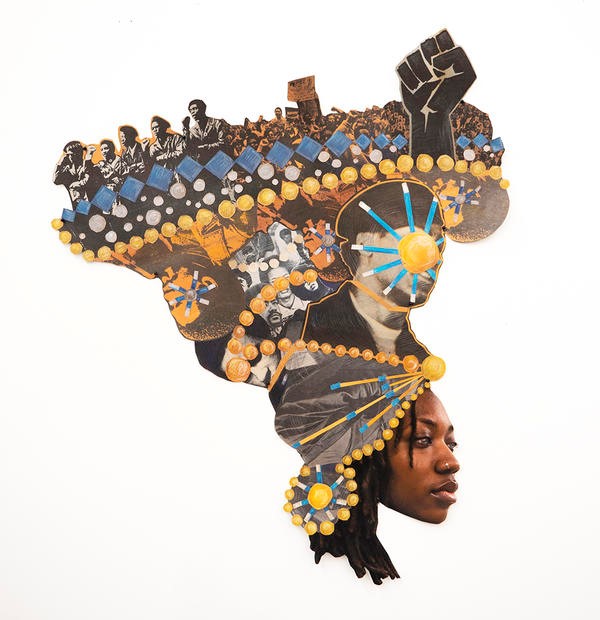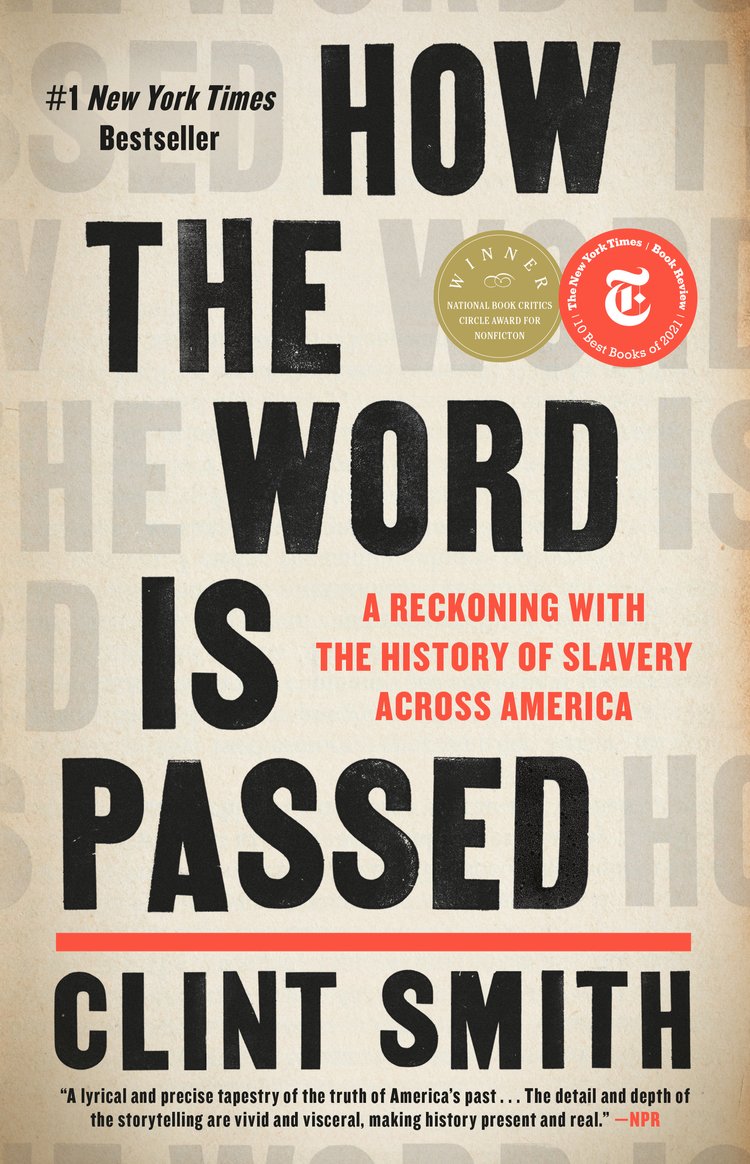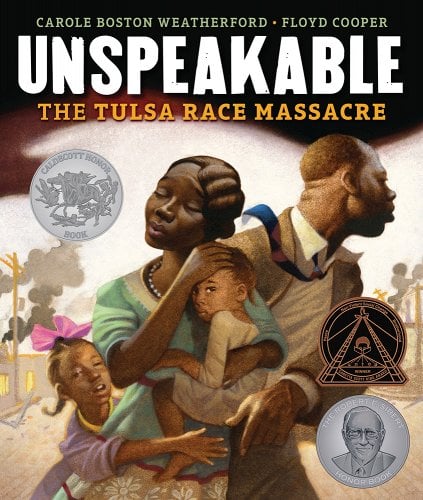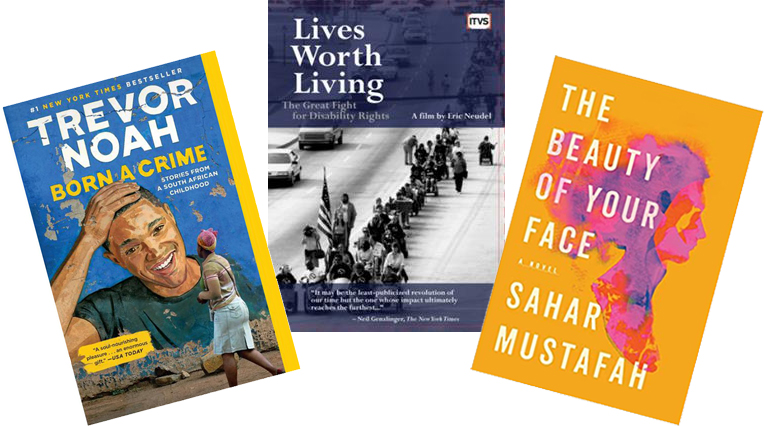

INSIDE THIS EDITION:
- Information from STAGES OF FREEDOM
- Celebrate Black History Month at the RISD MUSEUM: Three shows offer opportunities to consider themes of the history of slavery and racism and the roles that art and artists play
- RECOMMENDED READING: How the Word Is Passed: A Reckoning with the History of Slavery Across America by Clint Smith and Unspeakable: The Tulsa Race Massacre by Carole Boston Weatherford
- FROM THE AMERICAN WRITERS MUSEUM: Black History Month Reading List
- LLC's DIVERSITY, EQUITY AND INCLUSION BIBLIOGRAPHY
- COMMUNITY LIBRARIES OF PROVIDENCE: Three events celebrating Black History Month
- DAYBREAK IN ALABAMA by Langston Hughes
INFORMATION FROM
Carter G. Woodson: Father of Black History Month
Carter G. Woodson was a scholar whose dedication to celebrating the historic contributions of Black people led to the establishment of Black History Month, marked every February since 1976. Woodson fervently believed that Black people should be proud of their heritage and all Americans should understand the largely overlooked achievements of Black Americans.
Go to www.stagesoffreedom/on-the-rhode-to-freedom, a roadside guide to African American sites in Rhode Island:
“Stroll the highways and byways of Rhode Island and be astonished by the extraordinarily rich, compelling and groundbreaking contributions African Americans have made to the state’s landscape and cultural heritage. On foot or by car, or in the comfort or your own home, this guide will assist you in locating and exploring exciting sites, events and people. From slavery to abolition, reconstruction to the gilded age, from civil rights to present day, this is a story unlike any other in the country.” – Robb Dimmick
CELEBRATE AFRICAN AMERICAN HISTORY MONTH AT THE RISD MUSEUM
Three current shows in the galleries and cafe of the RISD Museum (20 North Main Street, Providence) offer interesting and provocative opportunities to consider themes of the history of slavery and racism and the roles that art and artists (from the 17th century to the 21st century) play in unlocking the stories of diversity, equality and inclusion, past and present.

Art and Design from 1900 to Now
For two years, the Museum developed partnerships among curators, students, teachers, and artists to create an opportunity to explain how every medium imaginable (sculpture, painting, textiles, photography and more) is in play at RISD in the classroom and in the museum. RISD explains: “…the installation reflects the interconnectedness of the disciplines RISD teaches and the cross pollination among art forms and media that can influence how artists work.” Five groups of artwork reveal the result of participant conversations on five different topics and reflections.
One can see varied art forms from the Museum’s modern and contemporary collections. Some art is newly acquired. Both underrepresented artists and designers (from many countries and nationalities) and rarely exhibited art from the RISD collection are featured.
This show closes June 9, 2024.
 Past Made Present: Dutch Shadows in the Black Atlantic
Past Made Present: Dutch Shadows in the Black Atlantic
The Dutch Golden Age (1609-1713) was the age of artists such as Rembrandt and Vermeer and a time of great trade and wealth for the Dutch due to their major involvement in the transatlantic slave trade and Colonialism. With a show that examines both contemporary art and 17th century art from the Museum’s collection, RISD proposes to show how art history has been shaped by the slave trade.
Paintings, prints. photographs, textiles and jewelry all have a part of play.
In addition to grants from the RI General Assembly, RI State Council on the Arts, and the National Endowment for the Arts, the RISD Center for Social Equity and Inclusion made this show possible.
This show closes August 6, 2023.
We’ve Been Here Before
(In the museum café and on the wall just outside the museum’s Benefit Street entrance)
“This installation features portraits of BIPOC (Black, Indigenous, and people of color) women and femmes or people who adopt a feminine appearance, manner or persona.”
The subject of each portrait wears a headdress that helps to identify and honor the person’s heritage.
The artist is Helina Metaferia, an Ethiopian American artist. The project was conceived in 2021 during a workshop with the museum’s Education Department.
RISD Museum commissioned this work, and all of the art will become part of the museum collection.
This show closes June 25, 2023.
RISD Museum Hours:
Tuesday, Wednesday, Saturday and Sunday: 10 AM – 5 PM
Thursday and Friday: 12 NOON – 7 PM
Admission is free on Sunday from 10 AM – 5 PM and on Thursday and Friday evenings from 5 PM – 7 PM
RECOMMENDED READING

How the Word Is Passed: A Reckoning with the History of Slavery Across America by Clint Smith
Beginning in his own hometown of New Orleans, Clint Smith leads the reader through an unforgettable tour of monuments and landmarks—those that are honest about the past and those that are not—that offer an intergenerational story of how slavery has been central in shaping our nation’s collective history, and ourselves.
It is the story of the Monticello Plantation in Virginia, the estate where Thomas Jefferson wrote letters espousing the urgent need for liberty while enslaving over 400 people on the premises. It is the story of the Whitney Plantation, one of the only former plantations devoted to preserving the experience of the enslaved people whose lives and work sustained it. It is the story of Angola, a former plantation-turned maximum security prison in Louisiana that is filled with Black men who work across the 18,000-acre land for virtually no pay. And it is the story of Blandford Cemetery, the final resting place of tens of thousands of Confederate soldiers.
In a deeply researched and transporting exploration of the legacy of slavery and its imprint on centuries of American history, How the Word Is Passed illustrates how some of our country’s most essential stories are hidden in plain view-whether in places we might drive by on our way to work, holidays such as Juneteenth, or entire neighborhoods—like downtown Manhattan—on which the brutal history of the trade in enslaved men, women and children has been deeply imprinted.
Informed by scholarship and brought alive by the story of people living today, Clint Smith’s debut work of nonfiction is a landmark work of reflection and insight that offers a new understanding of the hopeful role that memory and history can play in making sense of our country and how it has come to be.

Unspeakable: The Tulsa Race Massacre
By Carole Boston Weatherford
Winner of the Coretta Scott King Book Awards for Author and Illustrator
A Caldecott Honor Book
A Sibert Honor Book
Longlisted for the National Book Award
A Kirkus Prize Finalist
A Boston Globe-Horn Book Honor Book
"A must-have"– Booklist (starred review)
Celebrated author Carole Boston Weatherford and illustrator Floyd Cooper provide a powerful look at the Tulsa Race Massacre, one of the worst incidents of racial violence in our nation's history. The book traces the history of African Americans in Tulsa's Greenwood district and chronicles the devastation that occurred in 1921 when a white mob attacked the Black community.
News of what happened was largely suppressed, and no official investigation occurred for seventy-five years. This picture book sensitively introduces young readers to this tragedy and concludes with a call for a better future.
BLACK HISTORY MONTH READING LIST
From The American Writers Museum, americanwritersmuseum.org
- The 1619 Project: A New Origin Story edited by Nikole Hannah-Jones
- Crusade for Justice: The Autobiography of Ida B. Wells by Ida B. Wells
- The Fire Next Time by James Baldwin
- I Know Why the Caged Bird Sings by Maya Angelou
- Narrative of the Life of Frederick Douglass, an American Slave by Frederick Douglass
- Passing by Nella Larsen
- Pauli Murray: Shouting for the Rights of All People by Deborah Nelson Linck
- A Raisin in the Sun by Lorraine Hansberry
- Sing, Aretha, Sing! by Hanif Abdurraqib, illustrated by Ashley Evans
- South to America: A Journey Below the Mason-Dixon yo Understand the Soul of a Nation by Imani Perry
- Taught By Women: Poems as Resistance Language by Haki R. Madhubuti
- Teaching Black History to White People by Leonard N. Moore
- Their Eyes Were Watching God by Zora Neale Hurston
- Who’s Black and Why?: A Hidden Chapter from the Eighteenth-Century Invention of Race edited by Henry Louis Gates, Jr. and Andrew S. Curran
- Our Legacy: A Bold Reclaiming of Our Enslaved History by Schele Williams, illustrated by Tonya Engel
See more at americanwritersmuseum.org/black-history-month-reading-list/.
READING REMINDER: LLC DIVERSITY, EQUITY, AND INCLUSION BIBLIOGRAPHY

To browse the DEI Bibliography, use the following link where you can also access the Submission Form for recommendations: lifelonglearningcollaborative.org/dei-bibliography/.
You can find the bibliography on the LLC website under Programs > Diversity, Equity and Inclusion > DEI Bibliography.
Please direct your questions to Joan Hausrath at llc.hausrath@gmail.com.
CELEBRATING BLACK HISTORY MONTH

Daybreak in Alabama
By Langston Hughes
When I get to be a colored composer
I'm gonna write me some music about
Daybreak in Alabama
And I'm gonna put the purtiest songs in it
Rising out of the ground like a swamp mist
And falling out of heaven like soft dew
I'm gonna put some tall tall trees in it
And the scent of pine needles
And the smell of red clay after rain
And long red necks
And poppy colored faces
And big brown arms
And the field daisy eyes
Of black and white black white black people
And I'm gonna put white hands
And black hands and brown and yellow hands
And red clay earth hands in it
Touching everybody with kind fingers
Touching each other natural as dew
In that dawn of music when I
Get to be a colored composer
And write about daybreak
In Alabama.
